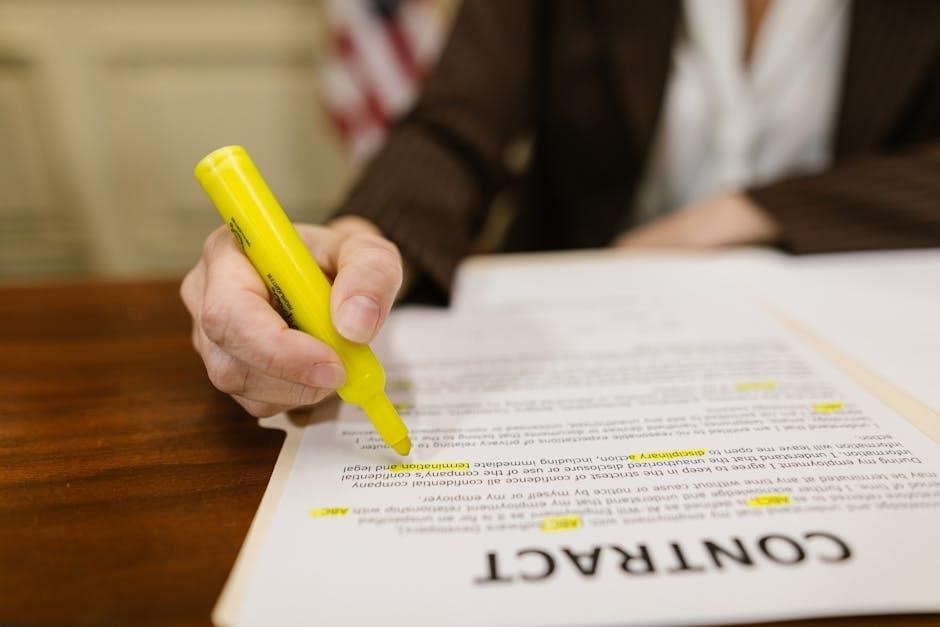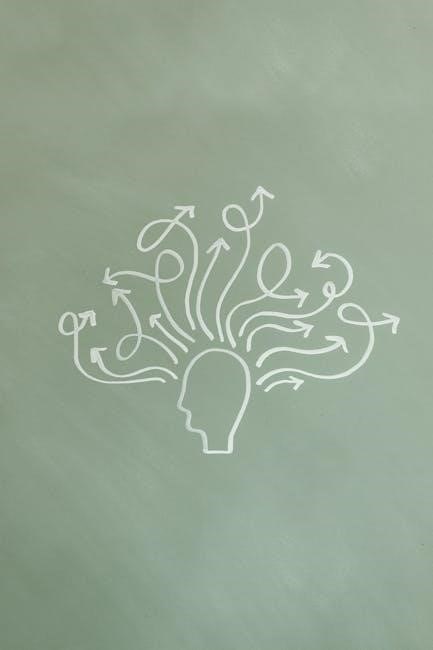Forensic and legal psychology explores the intersection of psychological science and the legal system‚ focusing on criminal behavior‚ evidence analysis‚ and justice․ The 4th edition by Costanzo and Krauss delves into real-world applications‚ theories‚ and ethical practices‚ offering insights into how psychology shapes legal decision-making and criminal investigations․ This field is crucial for understanding human behavior in legal contexts‚ making it a cornerstone for professionals and students alike․
Key areas include:
- Psychological assessments in criminal cases
- Eyewitness testimony reliability
- Legal decision-making processes
By integrating research and theory‚ forensic psychology aims to enhance justice and reduce crime‚ providing a comprehensive framework for understanding the complexities of human behavior in legal settings․
Overview of Forensic and Legal Psychology
Forensic and legal psychology examines the application of psychological principles to legal issues‚ focusing on criminal behavior‚ evidence evaluation‚ and justice systems․ It bridges psychology and law‚ addressing topics like eyewitness testimony‚ jury decision-making‚ and criminal profiling․ The field emphasizes the role of psychological assessments in legal contexts‚ such as competency evaluations and risk assessments․ By integrating research and practical insights‚ forensic psychology aims to enhance legal processes and improve outcomes․ This interdisciplinary approach is essential for understanding human behavior in legal settings‚ making it a vital tool for professionals in both psychology and law․
Key areas include:
- Criminal behavior analysis
- Psychological assessments in legal cases
- Improving legal decision-making
The 4th edition of Forensic and Legal Psychology by Costanzo and Krauss provides a comprehensive overview‚ blending theory with real-world applications to address these critical topics․
Importance of Forensic Psychology in the Legal System
Forensic psychology plays a crucial role in enhancing the accuracy and fairness of legal proceedings․ By applying psychological principles‚ experts can assess criminal behavior‚ evaluate eyewitness testimony‚ and determine competency to stand trial․ This field ensures that legal decisions are informed by scientific evidence‚ reducing biases and errors․ The insights from forensic psychology also aid in understanding victim behavior‚ improving jury selection‚ and developing effective rehabilitation programs․ Its integration into the legal system has revolutionized how crimes are investigated and prosecuted‚ making it an indispensable tool for justice․ The 4th edition of Forensic and Legal Psychology highlights these contributions‚ emphasizing the practical applications of psychological science in maintaining a just legal framework․
Key contributions include:
- Enhancing the reliability of legal decisions
- Addressing criminal behavior and rehabilitation
- Improving the fairness of legal processes
Forensic psychology bridges the gap between psychology and law‚ ensuring a more informed and equitable justice system․
Key Concepts in Forensic and Legal Psychology
Forensic and legal psychology focuses on understanding human behavior within legal contexts‚ emphasizing criminal behavior‚ evidence evaluation‚ and legal decision-making․ Key concepts include psychological assessments‚ eyewitness testimony reliability‚ and the role of bias in legal processes․ The field also explores the psychology of juries‚ the credibility of confessions‚ and the impact of trauma on victims․ Ethical considerations‚ such as maintaining objectivity and avoiding harm‚ are central to forensic practice․ Additionally‚ the integration of psychological research into legal frameworks ensures informed and fair outcomes․ These concepts are thoroughly explored in the 4th edition‚ providing a comprehensive understanding of how psychology shapes justice and legal systems worldwide․
Core areas of focus:
- Psychological assessments in legal cases
- Eyewitness testimony and memory accuracy
- Legal decision-making and bias mitigation
These concepts form the foundation of forensic psychology‚ enabling professionals to apply scientific knowledge to real-world legal challenges․

History of Forensic Psychology
Forensic psychology’s history traces its roots to early psychological insights applied in legal contexts‚ evolving over centuries to integrate science into justice systems‚ as detailed in the 4th edition․
Key milestones:
- Early applications of psychology in criminal investigations
- Development of psychological assessments for legal cases
Authors like Costanzo and Krauss document this growth‚ showing how the field has matured to address modern legal challenges effectively․
Early Developments in Forensic Psychology
The early developments in forensic psychology trace back to the late 19th and early 20th centuries‚ when psychologists began applying their knowledge to legal issues․ Wilhelm Wundt and James McKeen Cattell were pioneers‚ exploring areas like eyewitness testimony and criminal behavior․ The 4th edition highlights how these foundational studies laid the groundwork for modern forensic psychology‚ emphasizing its role in criminal investigations and legal proceedings․ Key milestones include the establishment of psychological assessments for suspects and the integration of psychological theories into courtroom practices․ These early advancements underscored the potential of psychology to inform justice systems‚ shaping the field into what it is today․ The textbook provides a detailed account of these formative years‚ illustrating how early ideas evolved into contemporary applications․
Evolution of Legal Psychology
Legal psychology has evolved significantly over the decades‚ integrating psychological principles into the legal system to address issues like eyewitness testimony‚ jury decision-making‚ and criminal behavior․ The 4th edition of Forensic and Legal Psychology highlights how the field has expanded to include cutting-edge research on memory‚ persuasion‚ and decision-making biases․ Early efforts focused on applying psychological theories to legal problems‚ while modern practices emphasize evidence-based approaches․ The evolution has also seen a growing emphasis on ethical considerations‚ ensuring that psychological insights are used responsibly․ This progression underscores the dynamic nature of legal psychology‚ continually adapting to new challenges and advancing justice through scientific understanding․ The textbook provides a comprehensive overview of this evolution‚ bridging historical foundations with contemporary applications․
Landmark Cases in Forensic Psychology
Landmark cases in forensic psychology have shaped the application of psychological principles in legal settings․ The 4th edition of Forensic and Legal Psychology details cases like United States v․ Frye (1923)‚ which established the Frye standard for admitting expert testimony․ Another pivotal case is Daubert v․ Merrell Dow Pharmaceuticals (1993)‚ which refined standards for scientific evidence․ These cases highlight how psychological research influences legal decisions‚ such as jury selection‚ criminal profiling‚ and eyewitness testimony․ The textbook provides in-depth analysis of these cases‚ demonstrating their significance in defining the role of forensic psychologists in courtrooms․ These landmark rulings have set precedents‚ ensuring that psychological insights are both scientifically valid and legally relevant․ This historical context is crucial for understanding modern forensic psychology practices․

Defining Forensic Psychology
Forensic psychology applies psychological principles to legal issues‚ focusing on criminal behavior‚ mental state assessments‚ and courtroom procedures․ It bridges psychology and law‚ aiding in investigations and trials․
This field uniquely combines:
- Psychological assessments
- Legal consultations
- Criminal profiling
Forensic psychology is crucial for understanding human behavior in legal contexts‚ making it distinct from clinical psychology․
Scope and Applications of Forensic Psychology
Forensic psychology applies psychological principles to legal issues‚ aiding in criminal investigations‚ trials‚ and policymaking․ Its scope includes assessing mental states‚ predicting behavior‚ and evaluating evidence․
Key applications include:
- Criminal profiling and behavioral analysis
- Evaluating competency to stand trial
- Assessing risk of reoffending
- Jury selection and eyewitness testimony
Forensic psychology also informs legal decision-making‚ enhances justice systems‚ and addresses public safety concerns‚ making it a vital tool in modern legal frameworks․
Role of Forensic Psychologists in Legal Proceedings
Forensic psychologists play a pivotal role in legal proceedings by providing expert opinions based on psychological evaluations․ They assess defendants’ mental states‚ determine competency to stand trial‚ and evaluate the reliability of eyewitness testimonies․
Their contributions include:
- Conducting psychological assessments
- Offering expert testimony
- Developing behavioral profiles
- Assisting in jury selection
By bridging psychology and law‚ forensic psychologists help ensure fair legal processes‚ enhance the accuracy of evidence‚ and support just outcomes in criminal and civil cases․
Differences Between Forensic and Clinical Psychology
Forensic and clinical psychology are distinct fields within psychology‚ each with unique focuses and methodologies․ Forensic psychology primarily applies psychological principles to legal issues‚ aiding in criminal investigations‚ assessing mental competency‚ and informing court decisions․ In contrast‚ clinical psychology focuses on diagnosing and treating mental illnesses‚ emphasizing therapeutic interventions and patient well-being․
Key distinctions include:
- Focus: Forensic psychology centers on legal contexts‚ while clinical psychology addresses mental health treatment․
- Setting: Forensic psychologists often work in courts‚ prisons‚ and law enforcement‚ whereas clinical psychologists operate in hospitals‚ clinics‚ and private practices․
- Role: Forensic psychologists serve as experts in legal matters‚ whereas clinical psychologists act as therapists and diagnosticians․
Understanding these differences highlights the specialized roles each field plays in addressing psychological issues within distinct settings․

Accessing Legal Literature and Resources
Accessing legal literature and resources is essential for forensic psychology․ Platforms like Google Scholar‚ JSTOR‚ and Perlego offer academic papers‚ books‚ and case studies․ The 4th edition PDF is available on these platforms‚ providing comprehensive insights into forensic and legal psychology․
Key resources include:
- Academic databases
- Legal case studies
- Fourth edition PDFs
These resources aid professionals and students in understanding the intersection of psychology and law‚ enhancing their knowledge and practical applications in the field․
Key Legal Documents and Cases
Key legal documents and cases form the foundation of forensic and legal psychology‚ providing real-world applications of psychological principles․ Landmark cases‚ such as those involving eyewitness testimony and psychological assessments‚ highlight the role of psychology in legal decision-making․ Legal documents‚ including expert reports and court transcripts‚ offer insights into how psychological evidence is presented and interpreted․ These resources are essential for understanding the practical implications of forensic psychology in the justice system․ By analyzing these cases and documents‚ professionals can better navigate the complexities of psychological evaluations and their impact on legal outcomes․ Such materials are often referenced in academic texts‚ including the 4th edition of Forensic and Legal Psychology‚ to illustrate theoretical concepts in action․
How to Use Legal Literature in Forensic Psychology
Legal literature serves as a vital resource in forensic psychology‚ providing insights into the application of psychological principles within the legal system․ To effectively use legal literature‚ professionals should focus on understanding landmark cases‚ legal statutes‚ and scholarly articles․ These materials offer practical examples of how psychological theories are applied in real-world legal scenarios․ For instance‚ studies on eyewitness testimony and psychological assessments highlight their impact on legal outcomes․ Additionally‚ legal literature can guide forensic psychologists in preparing expert reports and testifying in court․ By integrating legal literature with psychological research‚ professionals can enhance their understanding of the justice system and improve their practice․ This approach is well-documented in texts like the 4th edition of Forensic and Legal Psychology‚ which emphasizes evidence-based practices․
Free Resources for Forensic Psychology Students
Accessing high-quality resources is essential for forensic psychology students․ The 4th edition of Forensic and Legal Psychology by Mark Costanzo and Daniel Krauss is available in various formats‚ including EPUB and PDF‚ on platforms like ZLIB․PUB and Perlego․ These resources provide insights into criminal behavior‚ legal decision-making‚ and psychological assessments․ Students can also find free sample chapters and case studies online‚ offering practical examples of forensic psychology in action․ Additionally‚ open-access journals and online courses complement textbook learning‚ ensuring a well-rounded understanding of the field․
Key features of these resources include:
- Real-world case studies
- Discussions on eyewitness testimony
- Guidance on legal procedures

Practicing Ethical Forensic Psychology
Ethical practices are vital in forensic psychology to ensure justice and protect individuals’ rights․ Guidelines emphasize honesty‚ confidentiality‚ and impartiality‚ crucial for maintaining trust in legal proceedings․
Ethical Guidelines for Forensic Psychologists
Ethical guidelines are essential for forensic psychologists to maintain integrity and fairness in legal proceedings․ The 4th edition emphasizes impartiality‚ confidentiality‚ and transparency in assessments and testimony․ These standards ensure psychologists avoid conflicts of interest and provide unbiased opinions‚ upholding justice and protecting individuals’ rights․
Guidelines also address informed consent‚ avoiding harm‚ and respecting privacy․ Practitioners must adhere to professional codes‚ balancing legal obligations with ethical responsibilities․ Challenges arise in complex cases‚ but adherence to these principles is crucial for maintaining public trust and the integrity of forensic psychology practice․
Challenges in Maintaining Ethical Standards
Forensic psychologists face significant challenges in maintaining ethical standards‚ particularly in high-stakes legal environments․ The 4th edition highlights issues such as potential biases in evaluations‚ conflicts of interest‚ and pressures to provide opinions favorable to hiring parties․ Additionally‚ managing confidentiality while navigating legal requirements can be complex‚ requiring careful balancing to prevent ethical violations․
Another challenge is the evolving nature of legal and psychological knowledge‚ necessitating ongoing education to stay informed․ Ethical dilemmas may also arise when testifying in court‚ where the psychologist’s role as an expert must remain objective and unbiased‚ further complicating the adherence to ethical guidelines in dynamic legal settings․
Consequences of Unethical Practices
Engaging in unethical practices in forensic psychology can lead to severe consequences‚ such as loss of professional credibility and legal sanctions․ The 4th edition emphasizes that violating ethical guidelines can result in malpractice lawsuits‚ disciplinary actions by licensing boards‚ and even criminal charges in extreme cases․
Unethical behavior can also undermine the integrity of the legal system‚ casting doubt on the validity of psychological evaluations and expert testimony․ Furthermore‚ such actions may damage public trust in the field of forensic psychology‚ discouraging its use in promoting justice and rehabilitation․

Forensic and Legal Psychology: 4th Edition Overview
The 4th edition by Mark Costanzo and Daniel Krauss integrates psychological science with legal systems‚ offering insights into criminal behavior and justice․ It includes real cases for practical understanding․
Authors and Their Contributions
Mark Costanzo and Daniel Krauss are renowned experts in forensic and legal psychology․ Their 4th edition textbook is a seminal work‚ integrating psychological science with legal practices․ Costanzo‚ a distinguished psychologist‚ specializes in jury decision-making and eyewitness testimony‚ while Krauss focuses on child custody evaluations and legal psychology․ Together‚ they provide a comprehensive understanding of how psychological principles apply to criminal investigations‚ legal decision-making‚ and justice systems․ Their work emphasizes real-world applications‚ making it invaluable for students and professionals․ The authors’ contributions include bridging theory with practice‚ offering insights into criminal behavior‚ and promoting ethical standards in forensic psychology․ Their collaborative effort has significantly advanced the field‚ making the 4th edition a cornerstone resource․
Key Topics Covered in the 4th Edition
The 4th edition of Forensic and Legal Psychology by Mark Costanzo and Daniel Krauss covers a wide range of critical topics in the field․ It explores the history of forensic psychology‚ ethical practices‚ and the role of psychological assessments in criminal cases․ The book delves into eyewitness testimony‚ jury decision-making‚ and the reliability of forensic evidence․ Additionally‚ it examines the psychological aspects of criminal behavior‚ legal decision-making‚ and the impact of trauma on victims and witnesses․ Practical applications‚ such as child custody evaluations and expert testimony‚ are also highlighted․ The edition integrates real-world examples and case studies‚ making it a valuable resource for understanding the intersection of psychology and the legal system․
Key areas include:
- Psychological science in legal contexts
- Forensic assessment techniques
- Ethical dilemmas in forensic practice
These topics provide a comprehensive foundation for students and professionals in forensic psychology․
Updates and Improvements in the 4th Edition
The 4th edition of Forensic and Legal Psychology features several updates and enhancements․ New chapters on emerging topics such as the psychology of trauma and its impact on legal proceedings have been added․ The book also includes expanded discussions on eyewitness testimony reliability and the role of cognitive biases in jury decision-making․ Additionally‚ the authors have incorporated recent research on forensic assessment techniques and ethical dilemmas in practice․ The inclusion of more real-world case studies and practical examples makes the content more engaging and applicable․ These updates ensure the text remains current and relevant‚ providing students and professionals with a comprehensive understanding of the field’s latest developments․
Notable improvements include:
- Updated research on forensic psychology
- Enhanced practical applications
- Increased focus on ethical considerations
These improvements make the 4th edition a valuable resource for both academic and professional use․

Downloading Forensic and Legal Psychology PDF
The 4th edition PDF is accessible via academic databases‚ online platforms‚ and select websites․ Free and paid options are available‚ though legality and quality vary․
Key considerations:
- Free sources may lack certain features or updates
- Paid versions ensure full access and legality
Always verify the source to avoid unauthorized downloads․
Options for Accessing the 4th Edition PDF
The 4th edition of Forensic and Legal Psychology by Mark Costanzo and Daniel Krauss can be accessed through various platforms․ Free versions are available on websites like ZLIB․PUB and Perlego‚ which offer limited access to the content․ Paid versions can be purchased directly from publishers or retailers like Worth Publishers‚ ensuring full and legal access․ Additionally‚ platforms like Perlego provide e-book formats‚ including EPUB and PDF‚ for subscribers․ Some websites also offer free samples or partial downloads‚ which can be useful for previewing the material․ For academic purposes‚ students and professionals can request instructor samples or access the book through university libraries․ Always verify the legality and reliability of the source to avoid unauthorized downloads․
Popular platforms include:
- ZLIB;PUB
- Perlego
- Worth Publishers
- University libraries
Ensure compliance with copyright laws when accessing the material․
Free vs․ Paid Resources for the PDF
Accessing the 4th edition of Forensic and Legal Psychology offers both free and paid options․ Free resources are available on platforms like ZLIB․PUB and select academic databases‚ providing partial or full access to the PDF․ However‚ these may lack certain features or updates․ Paid resources‚ such as purchasing the e-book from Perlego or Worth Publishers‚ ensure full access to all content‚ including updates and additional materials․ Paid versions are recommended for comprehensive study and professional use‚ while free options are suitable for preliminary reviews or limited budgets․ Always choose legal sources to avoid copyright infringement․
Considerations for choosing:
- Depth of content needed
- Budget constraints
- Legal compliance
Opting for paid resources supports authors and ensures access to the complete‚ high-quality material․
Legal Implications of Downloading Copyrighted Material
Downloading copyrighted material‚ such as the 4th edition of Forensic and Legal Psychology‚ without proper authorization violates copyright laws․ This can lead to legal consequences‚ including fines and potential lawsuits․ Copyright infringement undermines the rights of authors and publishers‚ who invest significant time and resources into creating educational content․ Accessing copyrighted material illegally not only risks legal penalties but also discourages the creation of high-quality academic resources․ It is essential to respect intellectual property rights by using legal platforms or purchasing the material directly from authorized sources to support authors and ensure compliance with the law․
Key considerations:
- Respect for copyright laws
- Potential legal consequences
- Supporting authors and publishers
Always prioritize legal and ethical access to educational resources․

Using the Book for Academic and Professional Purposes
The 4th edition of Forensic and Legal Psychology is a valuable resource for both students and professionals‚ offering practical insights into criminal behavior analysis‚ legal decision-making‚ and ethical practices․ Its real-world case studies and theoretical frameworks make it an essential tool for academic learning and professional development in the field․
Key applications:
- Academic coursework and research
- Professional training and case preparation
- Enhancing courtroom strategies
It bridges theory and practice‚ aiding both scholars and practitioners in advancing their understanding and skills in forensic and legal psychology․
How to Apply Forensic Psychology in Real-World Scenarios
Forensic psychology can be applied in real-world scenarios by analyzing criminal behavior‚ assessing suspects‚ and aiding legal decision-making․ Professionals use psychological principles to evaluate evidence‚ predict behavior‚ and assist in jury selection․ The 4th edition provides practical insights‚ such as understanding eyewitness testimony reliability and profiling techniques․ It also emphasizes ethical practices‚ ensuring professionals maintain integrity in legal proceedings․ By applying these concepts‚ psychologists contribute to fair trials‚ crime prevention‚ and rehabilitation․ The book equips readers with tools to navigate complex legal cases‚ making it invaluable for both academic study and professional practice in forensic and legal psychology․
Case Studies and Examples from the Book
The 4th edition of Forensic and Legal Psychology includes numerous case studies and examples that illustrate the practical application of psychological principles in legal contexts․ These include analyses of criminal profiling techniques‚ jury selection strategies‚ and the impact of eyewitness testimony․ Real-world scenarios‚ such as high-profile criminal trials‚ demonstrate how psychological assessments influence legal outcomes․ The book also provides examples of how psychologists evaluate evidence and predict criminal behavior‚ offering insights into the complexities of legal decision-making․ These case studies are designed to deepen understanding of forensic psychology’s role in promoting justice and reducing crime‚ making the text a valuable resource for both students and professionals․
Integrating the Book into Coursework
The 4th edition of Forensic and Legal Psychology is an invaluable resource for coursework‚ offering a structured approach to understanding the field․ Instructors can assign specific chapters to align with course objectives‚ such as the history of forensic psychology or ethical guidelines․ The book’s inclusion of case studies and real-world examples makes it ideal for interactive discussions and assignments․ Students can analyze legal scenarios‚ evaluate psychological assessments‚ and explore the implications of forensic evidence․ The text’s clarity and depth also make it suitable for exams and research projects‚ providing a foundation for both theoretical and practical learning․ By integrating this book into coursework‚ students gain a comprehensive understanding of forensic psychology’s role in the legal system․
The 4th edition of Forensic and Legal Psychology provides a comprehensive understanding of the field‚ bridging psychological science with legal practices․ It equips students and professionals with essential insights‚ fostering critical thinking and practical application in real-world scenarios․ This resource remains indispensable for advancing knowledge in forensic psychology․
Final Thoughts on Forensic and Legal Psychology
Forensic and legal psychology is a dynamic field that bridges psychological science with the legal system‚ offering profound insights into human behavior and justice․ The 4th edition by Costanzo and Krauss is a seminal work‚ providing a comprehensive exploration of theories‚ applications‚ and ethical considerations․ It is an invaluable resource for students and professionals‚ facilitating a deeper understanding of how psychological principles can enhance legal decision-making and criminal investigations․ The book’s integration of real-world cases and cutting-edge research underscores its relevance and practicality‚ making it a cornerstone for anyone seeking to explore or advance in this critical field․
Key takeaways include:
- Enhanced understanding of psychological assessments in legal contexts
- Improved approaches to eyewitness testimony and evidence evaluation
- Strong emphasis on ethical practices in forensic psychology
By addressing these areas‚ the 4th edition not only educates but also inspires further exploration and application of forensic psychology in pursuit of justice and crime reduction․
Future Directions in the Field
Forensic and legal psychology is poised for growth‚ with advancements in technology and research reshaping its applications․ The integration of AI and virtual reality in psychological assessments and crime scene reconstructions is expected to enhance accuracy and efficiency․ Increased focus on interdisciplinary collaboration‚ particularly with neuroscience and criminology‚ will deepen understanding of criminal behavior․ Ethical considerations will remain central‚ ensuring practices align with legal and moral standards․ Additionally‚ globalization of forensic psychology will require standardized protocols to address diverse legal systems․ These developments promise to refine legal decision-making‚ improve justice outcomes‚ and expand the field’s impact on societal well-being․
Emerging trends include:
- Advanced technological tools for evidence analysis
- Greater emphasis on ethical and cultural sensitivity
- Expansion into global and comparative legal frameworks
Encouragement to Explore the Topic Further
Delving into forensic and legal psychology offers a fascinating journey through the intersection of human behavior and the legal system․ For those intrigued by the 4th edition of Costanzo and Krauss’s work‚ exploring real-world applications‚ such as psychological assessments in criminal cases and the reliability of eyewitness testimony‚ can deepen understanding․ Engaging with case studies and recent research provides practical insights‚ while resources like free PDFs and online courses make learning accessible․ Students and professionals alike are encouraged to pursue this field‚ as it not only enhances knowledge but also equips individuals with skills to contribute meaningfully to justice and societal well-being․
Recommended steps for exploration:
- Purchase or download the 4th edition for comprehensive insights
- Engage with online forums and academic journals
- Participate in workshops or courses on forensic psychology

